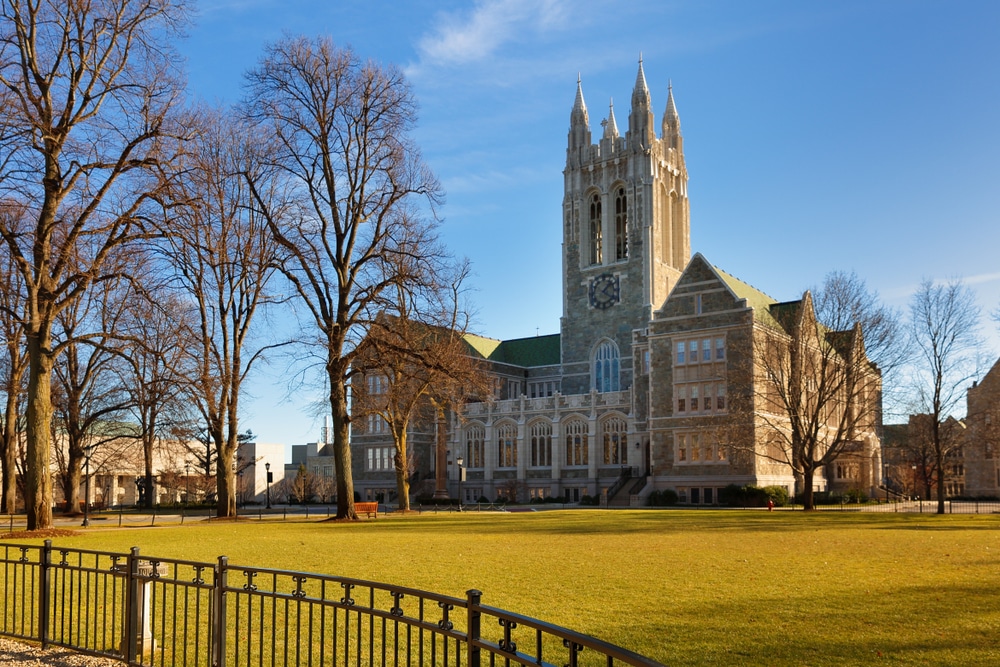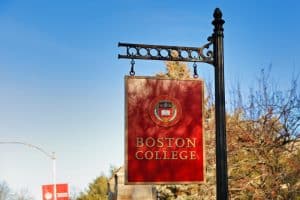Boston College Majors at a Glance
If you’re reading this, you’re likely standing at the crossroads of your academic journey, pondering which path to take. The decision you make here isn’t just about picking a subject you’re good at; it’s about aligning your academic pursuits with your life’s ambitions, passions, and the impact you wish to make on the world.
Boston College, with its rich Jesuit heritage, offers not just a plethora of majors but an educational experience steeped in tradition and aimed at the holistic development of students.
This article is your comprehensive guide to navigating the diverse, challenging, and rewarding Boston College majors. Whether you’re a prospective student, an undecided freshman, or even a current student contemplating a switch, this article aims to provide the insights you need to make an informed decision.
Why is choosing a major at Boston College a pivotal decision?
Selecting a major at Boston College is akin to choosing your adventure that will shape not just your college years but potentially your entire professional life. Boston College majors are designed to be more than just academic disciplines; they are pathways to self-discovery, understanding your role in the larger community, and making a meaningful impact in your chosen field.
The college’s Jesuit philosophy emphasizes “cura personalis,” or care for the whole person, encouraging students to integrate their intellectual, emotional, and spiritual selves.
Moreover, the college’s interdisciplinary approach means that your major doesn’t exist in a vacuum; it intersects with a broad liberal arts curriculum, offering a well-rounded education that prepares you for the complexities of the real world.
Whether you’re leaning towards the empirical rigors of STEM, the analytical depths of humanities, or the dynamic world of business and social sciences, know that each of these Boston College majors comes with challenges, opportunities, and rewards.
Your choice will determine the skills you acquire, the people you network with, and the doors that open for you in the future. So yes, it’s a pivotal decision that requires thoughtful consideration, self-reflection, and courage.
An Overview of Boston College
Boston College is a private institution established in 1863. Nine thousand four hundred eighty-four undergraduate and 5,250 graduate students are enrolled at BC.
The campus is 405 acres and is located in a suburban area in the Chestnut Hill neighborhood of Newton, Massachusetts, just six miles west of downtown Boston. Most of the academic and housing halls, the University’s athletic facilities, cafeteria facilities, and oldest buildings are on this campus.
It is categorized as a university with a high level of research activity by the Carnegie Foundation for the Advancement of Teaching. There are nine academic institutions at BC, including the Carroll School of Management, Lynch School of Education, and Boston College Law School, all offering highly regarded graduate degrees.
Boston College offers students a broad spectrum of academic choices, with over a hundred undergraduate majors, concentrations, and minors, enabling them to pursue various fields.
The faculty-to-student ratio at Boston College is 1:10, and 94% of BC’s 880 full-time professors are doctorate holders. This allows for more personalized attention, fostering a deeper understanding of the material and stronger relationships between students and faculty.
The BC Eagles have one of the nation’s t significant graduation rates for student-athletes, and the school competes in roughly 30 NCAA Division I varsity sports in the Atlantic Coast Conference. There are more than 300 clubs and organizations available for students to join. However, there is no Greek system on campus.
Each year, more than a thousand students avail themselves of the opportunities for study-abroad programs the institution offers.
What Is the Acceptance Rate for Boston College?
Boston College utilizes a holistic approach in its admissions process. Even though the school chooses students based on their academic aptitude and readiness, the admissions officers also include a variety of abilities and backgrounds in each class and consider how each student will benefit the larger BC community.
Each application is given the same degree of attention and consideration students have shown regarding time and effort. Boston College evaluates students’ academic performance, standardized test results, extracurricular activities, teacher and peer evaluations, and writing style in their decisions. There is no set method for admission; instead, BC aims to enroll in a diverse class in terms of students’ academic backgrounds, learning preferences, abilities, and personalities.
What is the acceptance rate for Boston College? The Class of 2026 had 40,494 applicants and accepted only 6,748 applications from the competitive admissions pool. This resulted in the lowest acceptance percentage in BC history, around 16.7%. This demonstrates how selective the school is.
You have a good chance of being admitted if you meet Boston College’s requirements for GPA, SAT/ACT scores, and other application requirements. Even if you meet all other admissions requirements, you will have a slim chance of being admitted if your GPA or SAT/ACT scores are below average.
Boston College needs you to be at the top of your class with a 3.96 GPA. You’ll need to receive almost all A’s to compete with other applications. It would be best to consider enrolling in challenging classes like AP or IB courses, as this demonstrates your ability to handle college-level coursework efficiently and supports your choice of Boston College majors.
Moreover, strong academic credentials are essential to enhance your chances of admission to this school due to its high level of selection. You will have a good chance of admission if your SAT score is 1490 or higher. It will be difficult for you to be accepted if your SAT score is 1370 or lower.
In the recent admission cycles, the Office of Undergraduate Admission had to veer away from many tried-and-true methods of interacting with accepted applicants and students, such as in-person campus tours or gatherings and presentations typically held in Devlin Hall.
Grant Gosselin, the director of undergraduate admission, and other admission officers used technology-enabled substitutes, such as virtual “open house” sessions that highlighted the academic and social highlights of the BC experience and live video tours of the campus led by student volunteers using smartphones and camera stabilizers.
Is Boston College A Diverse School?
Given that the institution is selective, you might ask, “Is Boston College a diverse school?” For the Class of 2026, the institution has admitted its best and most diverse group of students in university history, including 42% of AHANA (African, Hispanic, Asian, and Native American descent) students, 11% of first-generation students, 53% female students, and 9% of international students.
Let’s examine the admissions statistics for Boston College’s Class of 2026.
Secondary School Attendance
They were represented by 1,391 high schools from 44 states and 45 countries.
- Catholic and Jesuit: 20.6%
- Private/Independent: 29%
- Public: 50.4%
Geographic Distribution
- New England: 29.25%
- Mid-Atlantic: 30.45%
- Midwest: 9.12%
- South/Southwest: 11.01%
- West: 10.96%
- Other US States: 0.64%
- International: 8.57%
Top 10 Nations Represented
- China
- South Korea
- United Kingdom
- India
- Hong Kong
- Brazil
- Canada
- Spain
- Vietnam
- United Arab Emirates
Boston College enrolled 101 students through QuestBridge, a non-profit program that assists bright, low-income students in getting into the best colleges and universities in the nation and receive scholarships. For this class, Pell Grants, federal financial aid provided to undergraduate students with the greatest financial need, are awarded to 302 students. BC ranked #4 for the nation’s highest graduation rate of Pell Grant recipients.
What Majors Is Boston College Known For?
What majors is Boston College known for? Boston College majors comprise over a hundred undergraduate majors with specializations and minors. This gives the students the chance to earn degrees in various interdisciplinary fields. Students participate in the Core Curriculum in addition to the courses they take for their majors, minors, and electives, pushing them beyond their comfort zones and supporting the Jesuit goal of educating the whole person.
The Office of Institutional Research and Planning releases enrollment data for the academic year 2022–2023. This academic year, the most popular undergraduate majors are once again Finance (1,360 students), economics (1,260 students), biology (883), political science (743), psychology (571), and communication (570)– a ranking that hasn’t significantly altered in the past ten years.
BC’s Institutional Research and Planning division produced enrollment data for the University’s 9,484 undergraduate day students and 5,250 graduate students during the fall 2022 semester.
Computer science (556), nursing (418), and applied psychology and human development (382) are the other majors with the highest enrollment for the current academic year. Neuroscience, which debuted in 2019, is BC’s 9th most popular major, with 411 enrolled students. These numbers demonstrate that around 39% of undergraduates focus on STEM disciplines.
According to reported figures, the Lynch School of Education and Human Development enrolled 958 students, making it the school with the highest number of graduate students. BC’s Carroll School of Management follows this with 849 graduate students, closely followed by Morrissey College of Arts and Sciences (823) and BC Law School (813).
Other schools with high graduate enrollment include BC School of Social Work (633), Woods College of Advancing Studies (566), Connell School of Nursing (341), and School of Theology and Ministry (318).
According to the officers, the popularity of some Boston College majors may reflect broader cultural and generational trends. Still, it also undoubtedly reflects the students’ values who have decided to pursue a Jesuit Catholic education.
Five undergraduate majors at Boston College were in the top five in the country: Sociology (#4), Communication (#3), Marketing (#3), Philosophy (#4), and Accounting (#4). English (#11), Finance (#7), History (#13), Mathematics (#9), and Psychology (#8) are other undergraduate degree disciplines that made it to the top 15 list. Boston College was ranked #2 nationwide for graduate and professional degrees in Finance and #17 in Law.
How To Get Into Boston College?
Boston College has a highly high admissions standard. Approximately 16.7% of Boston College’s Class of 2026 applicants were accepted. Only 6,748 of more than 40,000 applicants were offered admission by the admissions committee.
However, 28% of applicants who used the Boston College Early Decision option for that incoming class were accepted. More than 4,400 applicants—nearly half of Boston College’s enrollment for the Class of 2026—used Early Decision I or II.
Though the tests are not required for admission to Boston College, students who submitted their test scores have an average SAT score of 1425, and the average ACT score was 33.
So, how do you get into Boston College? Admission to BC requires more than attaining the required SAT or GPA averages. It would be best if you started preparing early in your high school career to increase your chances of being admitted to Boston College.
Aim for high GPAs and SAT and ACT scores, demonstrate leadership and community involvement, and start composing your supplemental essays before the admissions deadline.
When you’re in high school, push yourself. Take the most challenging classes and pursue additional extracurricular activities like service, career, and athletics, but be sure you can balance them well. Your academic performance will largely influence your capacity to stand out on Boston College admissions committees.
It would be best to consider whether you want to apply for a Regular or Early Decision. This will affect your GPA plan as well. Before the Early Decision deadline, applicants should confirm that their grades and SAT scores correspond to the predicted average GPA and average ACT scores.
What is required for the Boston College application?
You must include a solid and well-researched application. Checking the boxes here is not all that this entails. Before the application deadline, you should plan and finish each component. If you would like, you can consider your pick among the Boston College majors in advance.
Boston College’s standard decision admissions deadline is January 1st, while the deadlines for early decision admissions are November 1st and January 1st.
Here are the admission requirements:
- A completed Common Application
- The supplemental essays from Boston College
- SAT or ACT scores (optional)
- Two teacher references
- A high school transcript
- A secondary school report and counselor referral form
- An interim report (after your first semester grades)
- Application fees or waivers of application fees
- Portfolios of artistic work (optional for students who intend to major in Studio Art)
- Results of the TOEFL, IELTS, or Duolingo English Tests (international applicants only)
How important are extracurricular activities in your application?
Your candidate profile, a 1-2 phrase summary of who you are and what you do, must include information on your extracurricular activities. What makes you distinctive is your candidate profile.
Therefore, if you put in the effort and demonstrate your interest, there is no correct or incorrect activity. Avoid attempting to impress Boston College admissions officers by compiling the extracurricular resume of the “average” applicant. Be your distinct and genuine self instead.
Let your enthusiasm for a subject of study, a sport, or a pastime show in your application if you are genuinely passionate about it. Authenticity will increase your chances of success despite the low acceptance rate of the college.
How to write a supplemental essay for Boston College?
Your application includes the Boston College supplemental essays required by the admissions committee. Students can choose among five prompts for the 2023-2024 admissions cycle. Pick a prompt for your application that enables you to be creative and share your true story.
Yes, your SAT and GPA are important, but so are the other aspects of your application. The supplemental essays are one of the rare chances you’ll get to create something from scratch. Therefore, utilize your paper to describe who you are and what makes you unique.
More Pieces of Advice About Applying to Boston College
Be genuine
The best applications are those that are genuine. If you want to know if Boston is the right place for you, watch the admissions films from Boston College or speak with a current Eagle. Next, concentrate your admissions strategy on the activities, courses, instructors, and groups you would participate in as a student. Draw a clear picture of how you might benefit the enrollment for the admissions committee.
Apply early
Make your admission plan as soon as possible. You should show that you are committed to your community and have an excellent academic record if you want to enroll at Boston College. Start participating in extracurricular activities in high school and look for opportunities to lead and develop.
Plan ahead
Preparing early for the admissions deadline is a crucial component of your application. Plan to beat the average SAT score and earn a high GPA. Additionally, begin drafting your supplemental essays months before you submit your application, especially if you’re submitting an early decision.
If you’re still unsure about how to start your college application at an earlier time, AdmissionSight is available to help.
We have an extensive experience in college admissions. Thus, we can assist you in choosing from the Boston College majors or complying with BC application requirements. Feel free to contact AdmissionSight and set up an initial consultation.










































